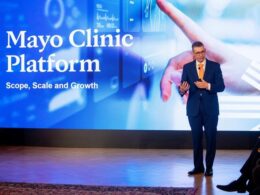The vital signs for success are alarmingly out of sync with a mandate to transform:
(1) Many Healthcare executives feel stuck in triage model
(2) …while EHR vendors have an important role to play, the EHR alone is not enough to drive transformation.
Digital Health Wire
JASON BARR
YAPRIL 11, 2022
Executive Summary
Summarized by Joaquim Cardoso MSc.
The Health Revolution Institute
Digital Health Unit
April 11, 2022
What is the context?
- THE MANDATE FOR HEALTHCARE to embrace digital transformation isn’t new. Healthcare executives have been struggling with digital transformation for years.
- Then COVID-19 hit. Suddenly, the world was forced to embrace digital transformation in a matter of days, not decades. And healthcare was no exception.
- …the pandemic has made digital transformation the number one imperative for 2022 and the rest of the decade.
What are the findings of the survey?
- 95% of respondents are focused on digital transformation, making it the number one imperative for the rest of the decade.
- The main obstacles that are stifling innovation are:
(1) interoperability ranked as the leading technical challenge (41%),
(2) implementation (25%) and
(3) data quality (23%).
What is the Digital Readiness Index of Health Care?
- When we look at the other results of this survey, the vital signs for success are alarmingly out of sync with this mandate to transform:
(1) Many Healthcare executives feel stuck in triage model
(2) …while EHR vendors have an important role to play, the EHR alone is not enough to drive transformation.
What are the challenges?
- the disconnect between healthcare’s high aspirations for digital transformation and the lack of data readiness that’s needed to support it is likely the biggest.
- Across the industry, data and the insights it can reveal are trapped in disconnected siloes within each institution, yet many organizations are still tackling data optimization as a one-off project vs. a foundational capability.
- As a result, only the health systems that crack the code on data readiness will have the foundation needed to sustain accelerated transformation over the long haul …
- it’s now or never — we’ve got to get healthcare un-stuck. And a key success factor to getting un-stuck is:
(1) data readiness and
(2) changing the way people think about interoperability.
What is the opportunity?
- The survey shows that while transformation is a top priority for almost all healthcare IT execs (95%), most are actually prioritizing near-term projects. It would seem that many are facing a false choice between investing in incremental improvements versus making the big bets that matter.
- All across healthcare, data and the invaluable insights and outcomes it can lead to are trapped in disconnected systems.
- (i) We have to ensure these systems have access to all of the patient’s data, so clinicians can have a complete view of the patient.
- (ii) We have to start working towards making actionable, useful, trustworthy data the new norm for all of healthcare.
What is the final message?
- It’s time to move beyond incremental changes and finally take the plunge into holistic digital transformation.
- In short, it’s time for a mindset intervention.

Although “digital transformation” probably tops the list of commonly used healthcare buzzwords, a new report conducted by Morning Consult and commissioned by Innovaccer paints a clear picture of why the term has become so popular, as well as the barriers standing in its way.
The “ Healthcare’s Data Readiness Crisis: Triage vs. Transformation “ report is based on
- survey results from a blue ribbon panel of 75 US health system executives,
- which explored their current views with respect to digital transformation.
Among the highlights of the survey was the fact that 95% of respondents are focused on digital transformation, making it the number one imperative for the rest of the decade.
- 83% are aiming to have their organizations achieve full digital transformation in under five years, which might as well be a fraction of a second in healthcare time.
- To accomplish this, healthcare IT leaders are prioritizing solutions that can make a measurable difference in the near-term, such as
– population health (41%),
– hiring talent (40%), and
– competitive analysis (40%).
95% of respondents are focused on digital transformation, making it the number one imperative for the rest of the decade.
When asked about the obstacles that are stifling innovation: (1) interoperability ranked as the leading technical challenge (41%), surpassing both (2) implementation (25%) and (3) data quality (23%).
- 42% said their organizations’ data is highly fragmented and siloed, and 58% didn’t believe that their EHR vendor could support their enterprise data strategy.
- Despite these hurdles, only 5% of executives are currently investing in data activation platforms that facilitate interoperability across all of their systems.
the main obstacles that are stifling innovation are:
(1) interoperability ranked as the leading technical challenge (41%), (2) implementation (25%) and
(3) data quality (23%).
Industry Impact
Out of all the takeaways from the report, the disconnect between healthcare’s high aspirations for digital transformation and the lack of data readiness that’s needed to support it is likely the biggest.
the disconnect between healthcare’s high aspirations for digital transformation and the lack of data readiness that’s needed to support it is likely the biggest.
Across the industry, data and the insights it can reveal are trapped in disconnected siloes within each institution, yet many organizations are still tackling data optimization as a one-off project vs. a foundational capability.
This results in short-term fixes to long-term problems and postpones any sort of true digital transformation.
Across the industry, data and the insights it can reveal are trapped in disconnected siloes within each institution, yet many organizations are still tackling data optimization as a one-off project vs. a foundational capability.
As a result, only the health systems that crack the code on data readiness will have the foundation needed to sustain accelerated transformation over the long haul, which should create a durable competitive advantage over slower organizations while pressuring others to follow suit.
As a result, only the health systems that crack the code on data readiness will have the foundation needed to sustain accelerated transformation over the long haul …
Originally published at https://digitalhealthwire.com on April 11, 2022.
ORIGINAL PUBLICATION (excerpt)
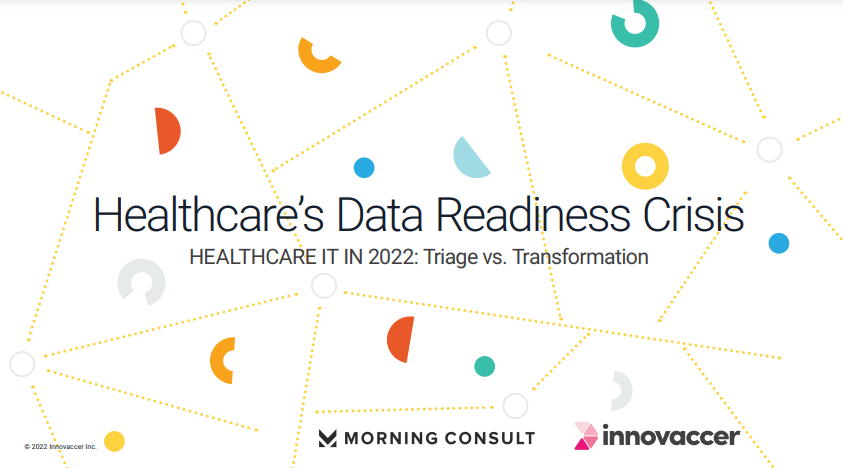
Healthcare’s Data Readiness Crisis
HEALTHCARE IT IN 2022: Triage vs. Transformation
Table of Contents (TOC)
- Executive Summary
- Healthcare Data Readiness in 2022
- AI and Digital Transformation Progress
- Executive Priorities: Triage vs. Transformation
- Conclusion: Time for a Mindset Intervention
- Methodology
Executive Summary
The Healthcare Data Readiness Crisis
THE MANDATE FOR HEALTHCARE to embrace digital transformation isn’t new. Healthcare executives have been struggling with digital transformation for years.
Then COVID-19 hit. Suddenly, the world was forced to embrace digital transformation in a matter of days, not decades. And healthcare was no exception.
THE MANDATE FOR HEALTHCARE to embrace digital transformation isn’t new. Healthcare executives have been struggling with digital transformation for years.
Then COVID-19 hit. Suddenly, the world was forced to embrace digital transformation in a matter of days, not decades. And healthcare was no exception.
Innovaccer recently commissioned the market researchers at Morning Consult to survey 75 healthcare leaders to understand how their organizations are navigating digital transformation within healthcare, and their overall outlook on digital transformation.
The responses reveal that the pandemic has made digital transformation the number one imperative for 2022 and the rest of the decade. Whereas the industry has had to content itself with incremental changes for years, now the challenge is to embrace change at a much faster pace.
…the pandemic has made digital transformation the number one imperative for 2022 and the rest of the decade.
But when we look at the other results of this survey, the vital signs for success are alarmingly out of sync with this mandate to transform.
Healthcare executives have long talked about transformation, but many feel stuck in triage mode.
What’s more, the research shows while EHR vendors have an important role to play, the EHR alone is not enough to drive transformation.
But when we look at the other results of this survey, the vital signs for success are alarmingly out of sync with this mandate to transform:
(1) Many Healthcare executives feel stuck in triage mode;
(2) …while EHR vendors have an important role to play, the EHR alone is not enough to drive transformation.
The responses in this study show that it’s now or never — we’ve got to get healthcare un-stuck. And a key success factor to getting un-stuck is: (1) data readiness and (2) changing the way people think about interoperability.
… it’s now or never — we’ve got to get healthcare un-stuck. And a key success factor to getting un-stuck is: (1) data readiness and (2) changing the way people think about interoperability.
The survey shows that while transformation is a top priority for almost all healthcare IT execs (95%), most are actually prioritizing near-term projects. It would seem that many are facing a false choice between investing in incremental improvements versus making the big bets that matter.
The survey shows that while transformation is a top priority for almost all healthcare IT execs (95%), most are actually prioritizing near-term projects. It would seem that many are facing a false choice between investing in incremental improvements versus making the big bets that matter.
Fortunately, the survey provides clues as to how healthcare leaders can tackle this challenge–and it starts with shifting the way we frame the challenge itself.
All across healthcare, data and the invaluable insights and outcomes it can lead to are trapped in disconnected systems.
- We have to ensure these systems have access to all of the patient’s data, so clinicians can have a complete view of the patient.
- We have to start working towards making actionable, useful, trustworthy data the new norm for all of healthcare.
All across healthcare, data and the invaluable insights and outcomes it can lead to are trapped in disconnected systems.
(i) We have to ensure these systems have access to all of the patient’s data, so clinicians can have a complete view of the patient.
(ii) We have to start working towards making actionable, useful, trustworthy data the new norm for all of healthcare.
When we approach it that way — from a perspective of data readiness — healthcare IT leaders can simultaneously address their near-term challenges while also establishing the foundation to sustain accelerated transformation over the long haul. It’s time to tackle this data readiness crisis head-on.
It’s time to rethink the cost of innovation and face the dire costs (and risks) of not innovating systemically.
It’s time to move beyond incremental changes and finally take the plunge into holistic digital transformation.
In short, it’s time for a mindset intervention. The results of this survey show us where to start.
It’s time to move beyond incremental changes and finally take the plunge into holistic digital transformation.
In short, it’s time for a mindset intervention.
SOME DETAILS OF THE REPORT (excerpt)
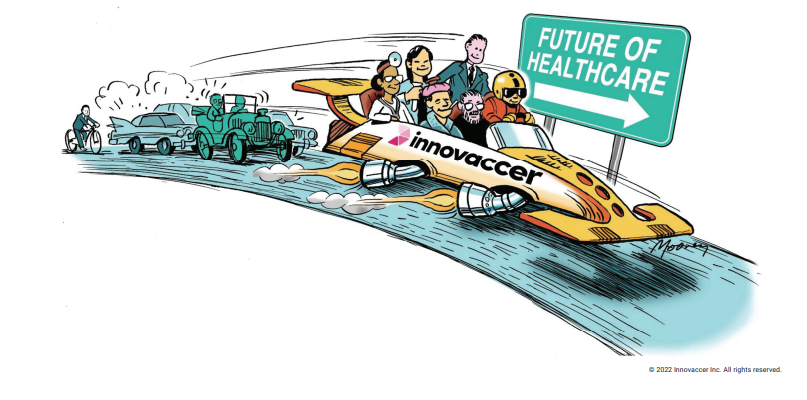
Digital transformation is the clear mandate for healthcare leaders
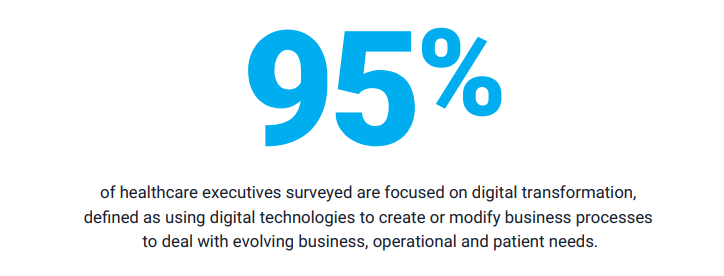
… but we’re facing a “data readiness crisis.”
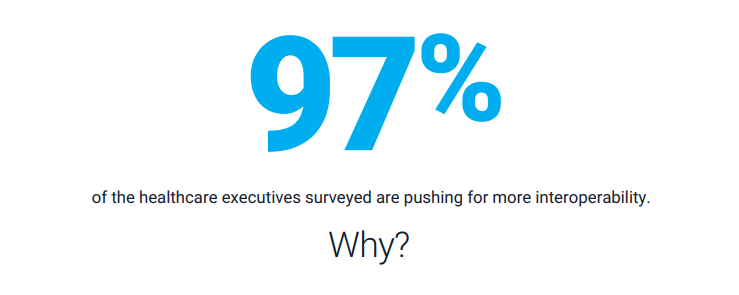
Interoperability is a critical priority for healthcare IT…
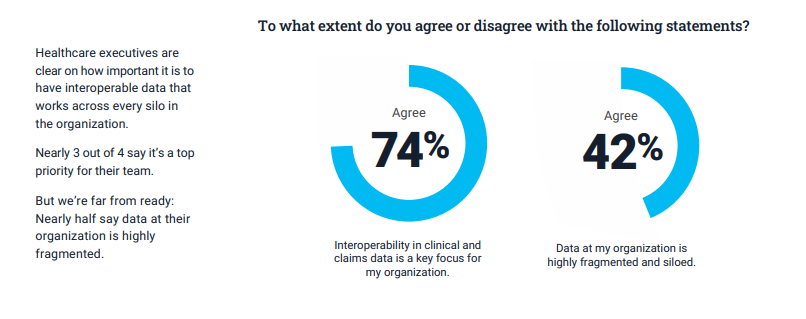
A lack of interoperability is stifling innovation.
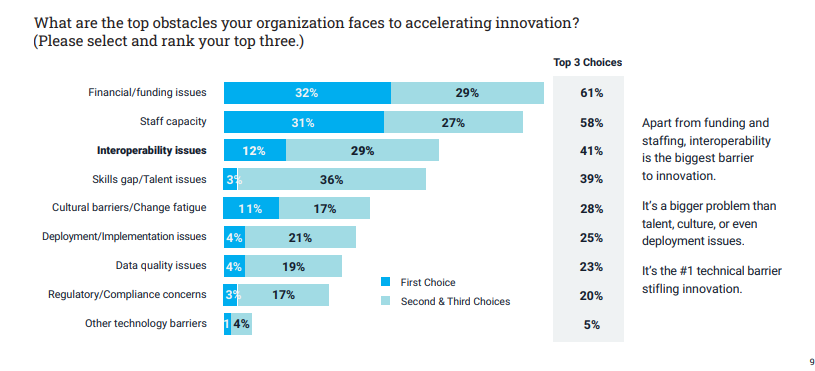
Solutions that drive interoperability and transformation are underfunded today
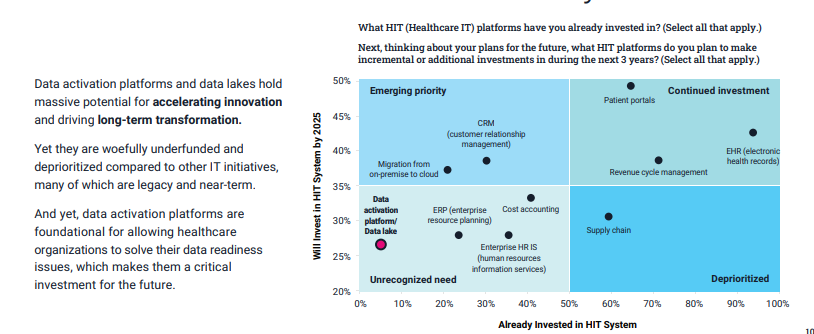
Interoperability investments are the fastest-growing investments for the future.
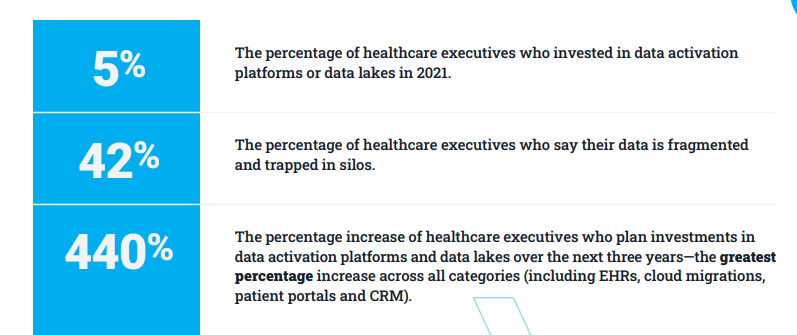
Investing in interoperability is an investment in both near-term triage and long-term transformation
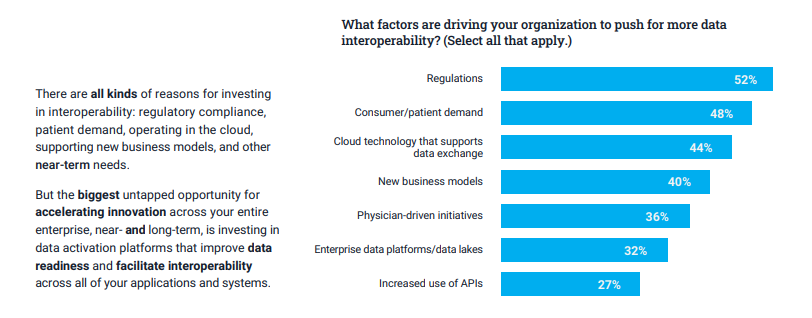
It’s time to challenge the false choice between triage and transformation
DATA READINESS IS KEY to achieving systemic interoperability in the long term, and vital for near-term priorities.
- In short, it’s the “critical path” to accelerating innovation for healthcare.
The problem is, when we think of data readiness transactionally, as a one-off project to support interoperability between two disparate silos, it often results in the creation of yet another data silo — and it certainly doesn’t advance the cause of systemic long-term interoperability. It only ends up making things worse in the long run.
- True interoperability isn’t a project. It’s the bedrock of digital transformation.
It has to be woven into the very fabric of all our IT systems.
And ultimately, healthcare needs data that’s complete, interoperable, and universally useful to everybody across the care continuum.
Let’s take a look at the state of healthcare’s digital transformation, and the impact data readiness is having on near- and long-term priorities.
- Not surprisingly, one of the most transformative technologies dependent upon data readiness is artificial intelligence (AI).
Originally published at innovaccer.












